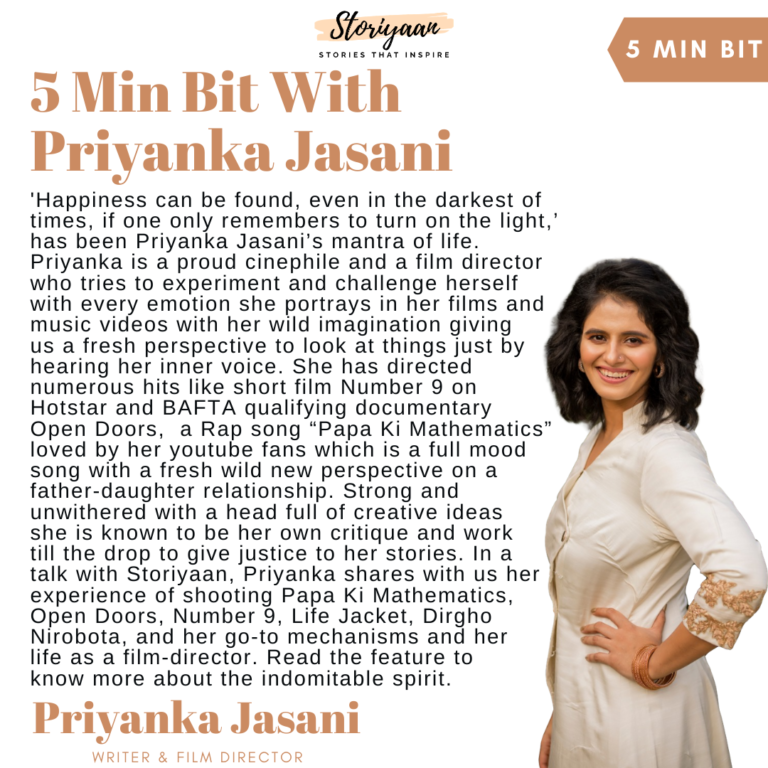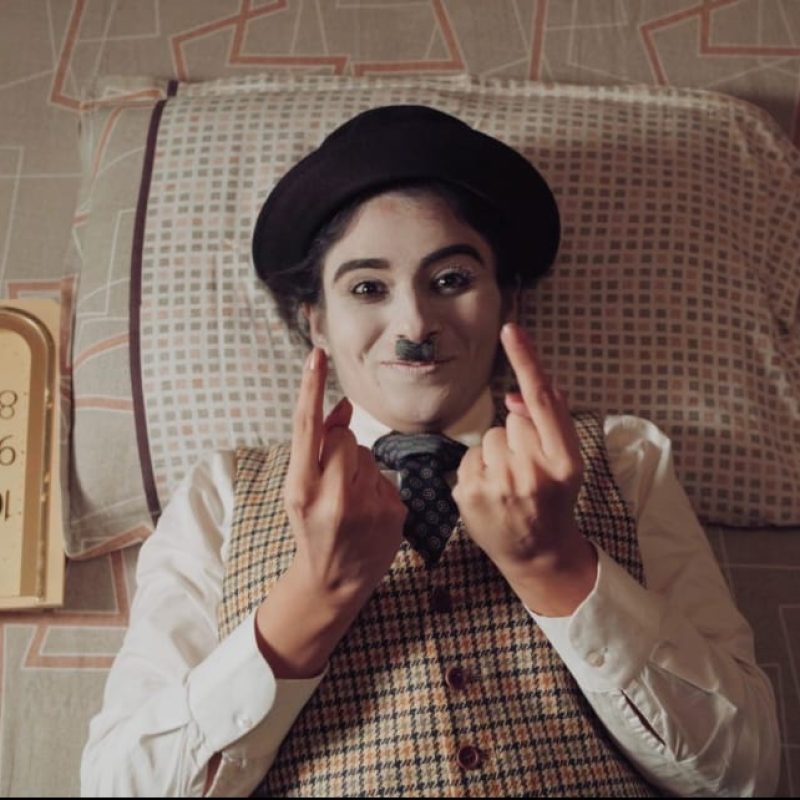‘Happiness can be found, even in the darkest of times, if one only remembers to turn on the light,’ has been Priyanka Jasani’s mantra of life.
Priyanka is a proud cinephile and a film director who tries to experiment and challenge herself with every emotion she portrays in her films and music videos with her wild imagination giving us a fresh perspective to look at things just by hearing her inner voice. She has directed numerous hits like the short film Number 9 on Hotstar and BAFTA qualifying documentary Open Doors, a Rap song “Papa Ki Mathematics” loved by her youtube fans which is a full mood song with a fresh wild new perspective on a father-daughter relationship. Strong and unwithered with a head full of creative ideas she is known to be her own critique and work till they drop to give justice to her stories.
In a talk with Storiyaan, Priyanka shares with us her experience of shooting Papa Ki Mathematics, Open Doors, Number 9, Life Jacket, Dirgho Nirobota, and her go-to mechanisms and her life as a film director. Read the feature to know more about the indomitable spirit.

Interview
Questions and answers
As a director, what has been your go-to mechanisms to get the best out of your actors on screen?
I feel engaging the actors in the process of the pre-production period helps the actors to get into the skin of the characters more smoothly. Also during the script reading process, interviewing the actor on a one-on-one basis as the character, asking him/her questions about his past or his attitude towards specific people and events will make him get into the character’s head and understand his background better. This brings out very realistic emotions and spontaneity during the time of the shooting. This has been one of my go-to mechanisms where I try the most to make my actors feel very character-friendly.
Director is the periphery of the film. What are the qualities of a filmmaker that can help get the best product on screen?
I think being tolerant and not crumbling under stress, being flexible to take up new ideas by the fellow cast and crew to elevate the film further, having a positive attitude as everyone on the set looks up to the director, making sure to build a base at the pre-production level which is strong and has immense clarity on paper to be confident before the director jumps to shoot physically, understanding film conventions, understanding how each human’s learning curve is different from one another and accordingly mold himself/herself to effectively communicate to their characters in their language of communication. These are the few qualities I think any filmmaker should have to give justice to their stories.
As a director, producer, and storyteller, do you think being open to approach during the filming and making on-set improvisation is essential? If so, can you tell us a scenario where it happened on your set?
I feel every storyteller or director has to be open to improvise. Although going off-script at times is risky but a lot of times magic happens when you do so. In my BAFTA-qualified documentary, “Open Doors,” we had interacted with many people from Ambedkar Nagar prior to the shoot and had spent more than 1 week with them to learn about their stories and lives. But the day we planned our shoot, we had selected certain people and families we were supposed to interview, being a little intimidated with the camera, a lot of them refused and we ended up approaching new people from the slum to interview and indeed we got the best stories to put out with intense emotions. So improvising actually can open new doors of new possibilities refining the perspectives of a storyteller.
Can you talk to us about the short film Number 9 that was a hit on Hotstar?
Number 9 was quite an adventurous journey that was thrown with challenges at each phase of its making. Many varied ideas came up as 4 different people were working on the script which also worked in our favour because then we had 4 minds which had fresh perspectives as well on each of our ideas, eventually helping to crisp out the script accordingly. Also, there were so many actors; matching their time and making a schedule accordingly was another daunting task that delayed the shoot further but managed to work things out later. And in post-production also, all the possible things went wrong due to the onset of Covid-19; as we lost a lot of time in between and then picked up the project again after months, getting people together amidst all the physical and creative challenges, we all made it happen to keep the faith. And all this couldn’t have happened without the support of the entire cast and crew and most importantly without the relentless support of Macaroon Media. Amid all these, we came up with collective ideas adding more value to the film, which finally was a massive success for us.
Your production house has come up with several projects that have gained a lot of fame. Can you tell us what made you take up Charlie Chaplin's character in the music video Life Jacket?
I introduced Charlie Chaplin because of this simple reason in the way he used to perceive life. He treated everything in life with a pinch of salt. And most importantly the way he used comedy to deal with the most difficult situations of life with such tenderness. He used to convert every trouble of his life into something so comical and light-hearted that whenever we saw him, we understood that the nuances of life are in their simplicity. And I wrote the screenplay in such a way that I could remind people to look at life through his glasses and realize the importance of their being, thus stop the immense mental torture while they are quarantined. Chaplin used to say ‘As I began to love myself, I recognized that my mind can disturb me and it can make me sick”. But as I connected it to my heart, my mind became a valuable ally. Today I call this connection “Wisdom of the Heart’”. So in “Life Jacket”, I tried to show that if Chaplin would have been with us during this pandemic quarantined, how would he have dealt with this situation and accordingly wrote my screenplay and performed it as well.
Can you walk us through the process of shooting Papa Ki Mathematics, and how did the idea to make something like this struck you?
It’s something I created during the lockdown. Having a single parent that too the one who has a discipline of an army officer had made my life miserable, so staying in the same house was getting really exhausting for me due to his demands with regards to food and perfection, as that was the only thing which gave him solace while we all were quarantined. But little by little, it was ruining me also from inside, so I decided to completely change the scenario for myself, hence created something comical out of something so serious to cope up with my situation. I started being more resilient just to analyze my dad’s character and in fact, started observing him while he used to scream and shout at me – thus realized that he is just like mathematics – a man with logic. For him 1+1 = 2, It can never be 1.99 or 2.1. So he was never wrong but maybe his way of communication wasn’t right which used to trigger me. And that’s when I started comparing his demands of food with mathematics and created a rap song. But I was very sure that I wanted to make it light-hearted and funny which in turn could help me cope up with my situation. In the process, I realized my patience towards my father had risen like never. And in turn, he also didn’t have a stimulus to react.
As a filmmaker, what are the measures you take when you are not fully satisfied with the end result? How do you overcome that ordeal?
I am a critique of my own work. I never really stop working until I am fully satisfied. This helps me put my all in each process of filmmaking from scripting to editing. For eg; I believe that even if you are not fully satisfied with the shooting process, editing gives you an opportunity to turn the tables around for your story to work out. Number 9, Dirgho Nirobota, and Papa ki Mathematics are some works where I have faced a lot of these challenges, but in turn, also made me smarter as a director and prompt me to deal with my challenges with new perspectives every time. I believe in overcoming the ordeal; one has to be ready to give their all and have faith that it will work out. And if it doesn’t, then it’s fine because each failure it’s trying to refine you to reach your higher goal. So for a committed person, overcoming the ordeal should be more fun than cathartic.
Can you speak a little about the projects in the Pipeline?
There are 3-4 projects in the Pipeline. Among these, one of the upcoming projects is a tribute I am giving to my Mom through a song called “Ehsaas” which has been written by me and a Delhi-based singer-composer Raghav Kaushik. I have collaborated with different artists from different cities where each one is getting a new perspective elevating the energy of the song further giving justice to the feel of the song. It’s a very special project to me where I am trying to convey a message to my mom but at the same time strengthening myself with self-love talk to cope up with a loss so hurtful. Everyone will be able to relate to the lyrics irrespective of any mishap or not and leave them with a wonderful mix of emotions. This is something that I’m trying to do with all my heart, and hopefully want it to reach people’s hearts with all its energy.

